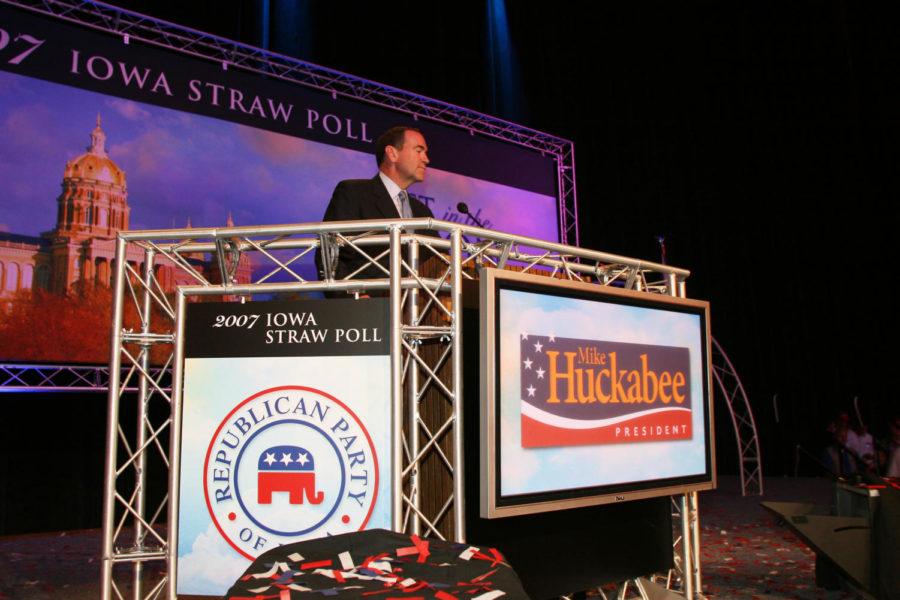Huckabee looks to recreate 2008 Iowa success
Republican presidential candidate Mike Huckabee gives a speech during the 2007 Iowa Straw Poll. Huckabee would go onto win the 2008 Iowa Caucus.
September 27, 2015
Mike Huckabee is no stranger to campaign success in the presidential race, and the 2008 Iowa Caucus winner is looking to be even more successful in his second bid for the White House.
Huckabee, the former Arkansas governor, ran in 2008, winning the the Iowa Caucus. He would later drop out and endorse eventual nominee John McCain after losing several states to the Arizona senator.
Huckabee was able to win over the support of Iowa’s biggest voting bloc in the caucus in 2008 — evangelical Christians. Almost no other candidate tried to appeal to the same base. According to a Washington Post poll at the time, 76 percent of America identified as Christian, and at least a third of caucus voters identify as religious.
“He could talk for an hour and never say the same thing twice,” said state Rep. Tedd Gassman, R-Scarville, who supported Huckabee in 2008 and again endorsed him in 2016.
Mack Shelley, professor of political science, said Huckabee has been tapping into the same base this year as his first campaign.
“The second time around, [he still has] his strong base of support, and he’ll also be able to awaken echoes from the past,” Shelley said.
Gassman said he still agrees with Huckabee’s views from his 2008 campaign, which is a reason why he endorsed him in 2016.
As for the 2016 race, Huckabee has struggled in the polls, consistently staying near the middle of the pack. A Real Clear Politics average of all Iowa polls shows Huckabee averaging support from 4.3 percent of Iowa caucus goers. Frontrunner Donald Trump, on the other hand, has support from 27.3 percent.
“It’s not anything he’s doing,” said Steffen Schmidt, university professor of political science. “The only thing he really needs to worry about are his opponents dropping out of the race.”
Two of Huckabee’s opponents — former Texas Gov. Rick Perry and Wisconsin Gov. Scott Walker — have left the race, but since their recent support was low, it’s hard to measure who will end up benefiting from their exits.
Schmidt said with a high number of candidates still in the race, it’s difficult to get noticed in the race.
Gassman said Huckabee should address other issues, such as welfare reform, or the need to reform the system and make sure it is not being abused.
“Don’t turn your back on issues that don’t go away,” he said.
Shelley said Huckabee will be able to keep his religious base from 2008, but he should worry about alienating segments, such as millennial voters, or parts of the Republican Party that focus on certain issues they believe are essential.
“Being more specific and bringing a new idea to the table about foreign policy,” Schmidt said when talking about ways Huckabee can appeal to other segments of the party.
Shelley said Huckabee should stay away from the controversial topics in the news right now. Huckabee made headlines for jumping in to support the Kentucky county clerk who was jailed for refusing to issue gay marriage licenses.
Huckabee has already made made dozens of trips to the state and will continue to travel to Iowa in the coming months. Iowa’s caucus is scheduled for Feb. 1, 2016.

















